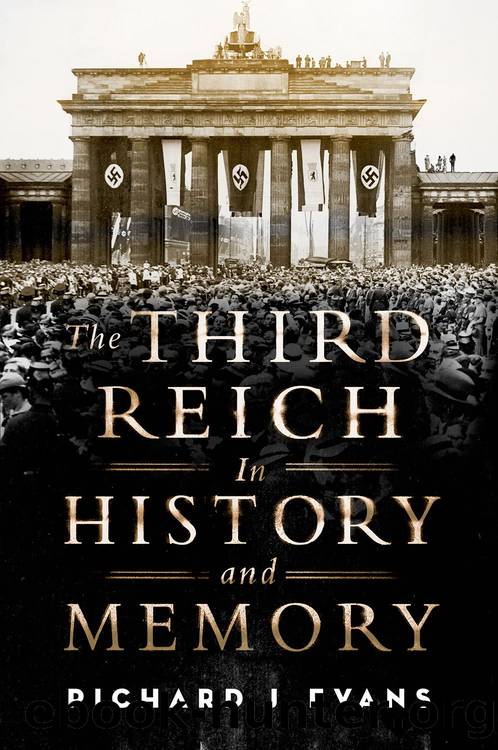The Third Reich in History and Memory by Evans Richard J.;

Author:Evans, Richard J.; [Evans, Richard J.]
Language: eng
Format: epub
Publisher: Oxford University Press, Incorporated
Published: 2015-01-27T00:00:00+00:00
16. Towards War
‘It is with Hitler and Hitler’s intentions,’ remarks Zara Steiner at the beginning of her magisterial contribution to the Oxford History of Modern Europe series, The Triumph of the Dark: European International History 1933–1939 (2011), ‘that any student of European international history must start.’ From the moment he became Chancellor, Hitler acted and other statesmen reacted.
His intentions were fixed long before he came to power. They were breathtaking in their ambition. Hitler was not a conventional European statesman. Governed by a Social Darwinist belief in international affairs as a perpetual struggle between races for survival and supremacy, Hitler repeatedly told his leading military and naval officers that Germany would conquer Eastern Europe, aggrandising its vast agricultural resources for itself and pushing aside those who lived there to make way for the expansion of the German race’s ‘living space’. France, Germany’s traditional enemy in the west, would be subjugated to allow Germany to become Europe’s dominant nation. This was not a normal German foreign policy in any sense; nor was it determined by the structural factors inherent in the international system of Europe since the nineteenth century, as some have argued.
Of course, Steiner concedes, Nazi Germany was not controlled by a monolithic policy-making structure, and different groups and individuals in the higher echelons of the regime often pursued their own agendas. This was particularly the case with Joachim von Ribbentrop, who graduated from being head of the Nazi Party’s foreign affairs bureau to being the ambassador in England and then Foreign Minister. ‘Vain, aggressive, and self-important’, in Steiner’s words, Ribbentrop developed a rabid Anglophobia and did his best to dissuade Hitler from pursuing the idea of an Anglo-German alliance. Britain, he said, was ‘our most dangerous enemy’. Fuelled by perceived slights during his time in London, where his tactlessness earned him repeated and increasingly outspoken criticism in the press, the Foreign Minister eventually succeeded in weaning Hitler away from the alliance project. The Nazi leader continued to hope for British neutrality in the coming conflict, however.
Others, such as Hermann Göring, also on occasion ploughed their own furrow, or influenced Hitler in one direction or another. Yet in the end, it was Hitler – rather than an ill-defined ‘polycracy’ – who determined Germany’s foreign policy. ‘Whether Germany was led by Bismarck, Wilhelm II, or Hitler made a vital difference to its policies,’ Steiner observes. Germany, Hitler declared in Mein Kampf, would ‘either be a world power, or cease to be.’ Once hegemony had been achieved in Europe, so Hitler adumbrated in his Second Book, Germany would enter into a power struggle with America for world domination. In order to achieve this, Germans, equated by Hitler with the ‘Aryan’ race, would have to deal with their arch-enemies the Jews, whom Hitler’s paranoid political fantasies portrayed as engaged in a global conspiracy to subvert German civilisation.
Increasingly, Hitler came to identify America as the epicentre of this supposed conspiracy, with Jewish capital working through US President Franklin D. Roosevelt. All of this would
Download
This site does not store any files on its server. We only index and link to content provided by other sites. Please contact the content providers to delete copyright contents if any and email us, we'll remove relevant links or contents immediately.
| Archaeology | Essays |
| Historical Geography | Historical Maps |
| Historiography | Reference |
| Study & Teaching |
Underground: A Human History of the Worlds Beneath Our Feet by Will Hunt(11808)
Sapiens by Yuval Noah Harari(5094)
Navigation and Map Reading by K Andrew(4859)
The Sympathizer by Viet Thanh Nguyen(4058)
Barron's AP Biology by Goldberg M.S. Deborah T(3925)
5 Steps to a 5 AP U.S. History, 2010-2011 Edition (5 Steps to a 5 on the Advanced Placement Examinations Series) by Armstrong Stephen(3618)
Three Women by Lisa Taddeo(3255)
The Comedians: Drunks, Thieves, Scoundrels, and the History of American Comedy by Nesteroff Kliph(2984)
Water by Ian Miller(2934)
Drugs Unlimited by Mike Power(2467)
The House of Government by Slezkine Yuri(2088)
DarkMarket by Misha Glenny(2083)
A Short History of Drunkenness by Forsyth Mark(2048)
And the Band Played On by Randy Shilts(1993)
The Library Book by Susan Orlean(1981)
Revived (Cat Patrick) by Cat Patrick(1875)
The Woman Who Smashed Codes by Jason Fagone(1860)
The House of Rothschild: Money's Prophets, 1798-1848 by Niall Ferguson(1796)
Birth by Tina Cassidy(1789)
